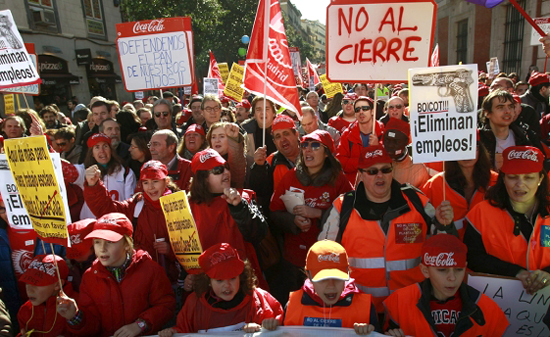
On 1 July, some of the most draconian restrictions on the right to protest in existence in Europe came into effect in Spain. The Civil Security Act, known as the Ley Mordaza, or ‘Gag Law’, criminalises protest of almost every kind and has been criticised by the United Nations as having ‘a chilling effect’ on the freedom of peaceful assembly. It is a symptom of the government’s fear of the growing opposition to its austerity measures and repressive policies. On the eve of the introduction of the law, thousands of people marched in protest in 20 Spanish cities. Juanjo Rivas reports from Madrid.
The Gag Law
The new law has been accused of taking Spain back to the dark days of fascism. It is a direct attack on the imaginative, radical and effective methods of protest developed over the last few years to challenge ruling class austerity and corruption. The Gag Law imposes fines of up to €600 for, amongst other things:
- filming, photographing or recording police;
- holding unauthorised gatherings;
- lack of respect for the police;
- occupying banks and other buildings.
Fines can soar to €30,000 for:
- protesting in front of Congress, the Senate or local parliaments;
- preventing an eviction;
- disobeying or resisting authority.
Organising events banned by the police or protesting ‘within the infrastructure of basic public services’ (such as power plants) incur fines of up to €60,000. The new law also legalises greater repression against migrants on the border with Morocco.
The conservative Partido Popular government of Mariano Rajoy is also taking steps to prevent further electoral challenges ahead of Spain’s general election in November. This follows its losses in regional and municipal elections on 24 May. At the end of July the government presented proposals to prevent left-wing and social democratic parties forming coalitions after the election, as happened in May.
The limits of Podemos?
The radical coalitions that emerged after the May elections, in which millions of voters rejected the austerity policies of the ruling party, have brought some small-scale benefits, such as negotiations with private banks to find alternatives to evictions (such as exchanging mortgages for social rent) and the introduction of free school meals for children from poor families. However, they have also exposed their limitations.
The need to form coalitions with the social democratic PSOE has forced left-wing parties to abandon some of their original plans and attempt only modest reforms which do not challenge Spain’s economic structures. It is noticeable that Podemos, for example, has refused to criticise Syriza in Greece, despite its ignominious capitulation to European imperialism, ignoring the popular vote. Podemos speaks vaguely of ‘participatory democracy’, not class struggle, and adopts the populist strategy of attempting to integrate well-known intellectuals, actors and other celebrities under its umbrella.
These emerging movements pretend to be a new left, but in reality have cut themselves off from previous struggles and the history of the working class. Podemos has refused to join the new left-wing coalition Ahora en Común, saying it is ‘too young’; Podemos leader Pablo Iglesias described the traditions of the left as a burden, claiming they were carrying ‘the stones of the old left on their backs’. One unfortunate consequence could be that the left vote is split at the general election, as the working class feels disillusioned.
Resistance
Nonetheless, there are a number of ongoing struggles, including strikes at the post office, Movistar, the Phone House, Koolair, Coca-Cola and rural firefighters. These different struggles have supported each others’ pickets and had a joint march in Madrid on 15 July.
Social and political movements are also building in all major towns for the third March for Dignity on 22 October. These are genuine attempts to build a movement from below. This year’s slogan is ‘Bread, Homes and Dignity’.
On 17 June, there was a major protest in solidarity with a framed prisoner. In 2012, during a general strike, 20-year-old Alfonso Fernandez was arrested, threatened with being charged with terrorism if he did not provide names of activists in revolutionary groups. He refused to be blackmailed. A huge campaign was set up to demand the dropping of the charges. But three years later, the High Court accepted the ‘evidence’ (a bag with ‘explosive material’ no-one had ever seen before, without Fernandez’s fingerprints and not properly secured as police evidence) and imposed a four-year prison sentence. Rather than being given the customary 15 days to surrender himself voluntarily to police, Fernandez was immediately declared ‘on the run’ . Within hours, riot police surrounded a wall of hundreds of activists and forced them to remove their masks one by one until ‘Alfon’ was identified and taken to prison. The campaign continues to expose this clear breach of human rights.
The struggle in Catalonia
Last November, over two million people voted in a referendum on independence forced on the right-wing ruling CiU party by nationalists. Both the referendum and the result were ruled illegal by the Spanish Constitutional Court.
Now it seems that for many, Catalonia’s regional parliamentary elections on 7 September, will become an unofficial referendum on self-determination, and the region’s political organisations are manoeuvring accordingly.
The pro-austerity CiU, which represents mainly Catalonia’s entrepreneurs and ruling class, is attempting to form a coalition and draw up an ‘independence list’ of candidates, headed by CiU leader Artur Mas. Podemos has joined a coalition with green and reformist parties, which defend ‘the right to choose’ for Catalonians. A third coalition is formed by the independent Candidates of Popular Unity, formed by class-conscious activists and communists and left-wing nationalists.
Also in Catalonia there has been an open discussion with 200 grassroots organisations about reforming detention centres for migrants and asylum seekers to improve their rights, and eventually closing them. The Catalonian Parliament has agreed to draft a law about this. In contrast, Spain has accepted only 1,300 asylum seekers of the quota of 4,288 it was assigned by the European Union.
FRFI 246 August/September2015




